Randy Alcorn's Blog, page 8
June 11, 2025
A Spirit of Entitlement Is One of the Greatest Enemies of True Happiness

Though all of us, if asked, might say that we don’t have any more right to a perfect and pain-free life than the next person, in our own hearts and minds, we tend to believe that we do. So, when forced to suffer, even mature believers can feel driven to question God’s motives, or perhaps even His existence! We imagine that if we are faithful and obedient to God, He will reward us with an easy life. However, God doesn’t promise pain-free lives—He only promises His presence and the provision of all we need to endure our hardships.
Entitlement is one of the ugliest words in the English language. It is the ultimate recipe for unhappiness. Nothing is more poisonous or contagious than the spirit of entitlement. And nothing can correct it but Scripture itself. Consider these verses from 1 Peter:
“…If when you do good and suffer for it you endure, this is a gracious thing in the sight of God. For to this you have been called, because Christ also suffered for you, leaving you an example, so that you might follow in his steps” (2:20-21).
“Beloved, do not be surprised at the fiery trial when it comes upon you to test you, as though something strange were happening to you. But rejoice insofar as you share Christ’s sufferings, that you may also rejoice and be glad, when his glory is revealed” (4:12-13).
“Therefore let those who suffer according to God’s will entrust their souls to a faithful Creator while doing good” (4:19).
We don’t suffer despite the fact that we are Christians, but sometimes because we are Christians. Contrary to the claims of prosperity theology, we have actually been “called” to suffer. While suffering we are not to despair, but look to the example of Christ who suffered for us for the sake of God’s greater glory and our ultimate, eternal happiness!
We must remember that our happiness is limited in this life, but unlimited in the life to come. A “normal day” as resurrected people on the New Earth will be far better than the best day we have experienced in a world under the Curse.
Recommended Reading
 God's Promise of Happiness
God's Promise of Happiness  Happiness (softcover)
Happiness (softcover) 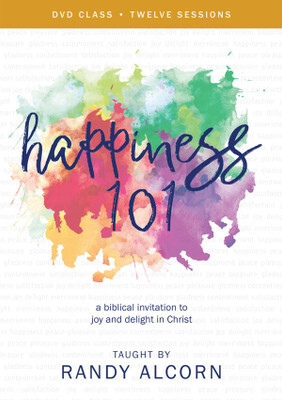 Happiness 101 Class (DVD)
Happiness 101 Class (DVD)
June 9, 2025
The Ultimate Answer to Loneliness Is Theological

At times all of us are lonely, but to be chronically lonely is to live with almost unbearable stress. Loneliness may begin with a sense of disconnection from others. You may feel you don’t deserve attention, or feel that no one would want to spend time with someone like you. If you know Christ, you need to embrace a biblical view of yourself that goes beyond the fact that you are a sinner and unworthy of God’s grace. That’s true of all of us. But it’s also true that God loves you and has redeemed you, and that you are in Christ fully acceptable to God and precious in His sight. Jesus promised, “I will be with you always” (Matthew 28:20). Meditate on that and you will not only be less lonely, but your changed perspective will give you greater confidence to build relationships with others.
Another cause of loneliness is individualism. The more we become aware of ourselves as individuals, the more we develop a sense of separation from others. Studies demonstrate that loneliness is more widespread and intense in societies which elevate freedom and individuality than in those which elevate corporate solidarity.
The inner person is habitually set aside in our society because secularism—seeing us as different in degree but not in kind from animals—inevitably denies or de-emphasizes our spiritual natures. But there is in our hearts a deep longing for God, who is the source of happiness and purpose. Pascal said, “There was once in man a true happiness…,” the loss of which created a terrible emptiness. He added, “This infinite abyss can be filled only with an infinite and immutable object; in other words by God himself.”
When our inner person is unfilled and we are out of touch with our Creator, we are left with a sense of cosmic loneliness. We may surround ourselves with people and events and things and activities and noise, but at best these are anesthetics that only cover for the moment the burning pain of our alienation from God—the worst kind of loneliness.
The ultimate answer to loneliness therefore is theological. We must become connected to the One who alone gives not only deliverance from sin, but meaning and purpose and personal relationship. This is what the Bible calls reconciliation. We who were wrong with God are made right with Him, we who were distant from Him are brought near to Him.
What made reconciliation possible? Jesus Christ becoming for us the loneliest being in the universe:
God made him who had no sin to be sin for us, so that in him we might become the righteousness of God. (2 Corinthians 5:21)
About the ninth hour Jesus cried out in a loud voice, “Eloi, Eloi, lama sabachthani?”—which means, “My God, my God, why have you forsaken me?” (Matthew 27:46)
In His substitutionary atonement, Christ became our sin, and for the first and only time He was utterly forsaken by His Father. Jesus hung on the cross in all His misery, cloaked in the darkness of absolute aloneness. He experienced the hell of alienation from God so that we would not have to—so we can now enjoy the relationship we most desperately need.
No encounter with a human being can ever replace this ultimate encounter with God. As F.B. Meyer said, “Loneliness is an opportunity for Jesus to make Himself known.”
On the other hand, we are social beings. We need encounters not only with God, but as one child in a story put it, “Someone with skin on.”
While the effect of Jesus’ incarnation was to put skin on God, the physical Jesus is not now with us to look at and listen to and touch and hug. Yet we are physical beings as well as spiritual, and we need human touch here and now. This is why each of us in our own way reaches out to others.
No person is an island. We all need to be connected, to belong. R. C. Sproul wrote, “The first negative judgment we find in Holy Writ is a judgment on loneliness. God said, ‘It is not good for man to be alone.’”
We all need a family, one or more people who provide us the support system that helps keep us afloat. Jesus affirmed that the greatest commandment was to love God, but that the second, inseparable from the first, was to love our neighbor. He never considered these commands incompatible. He saw the second flowing directly from the first. One of the highest ways we love God is by loving people.
We need each other more than ever. The Bible emphasizes the priority of caring for widows, orphans, and any others who are unattached to the warmth and security of the family (see Deuteronomy 10:18, I Timothy 5:3, James 1:27). We must become more alert to adopting and integrating into our families single people (never-married, divorced, or widowed) who do not have close-knit families or who live far away from their families.
Those of you experiencing the stress of loneliness may need to take the initiative to reach out to a family. Invite them over for dinner. Text a friend or acquaintance and ask to meet for lunch or coffee or a walk. Don’t be afraid to say, “I need you,” and “I need you to need me.” In your loneliness, consider others who may be lonely too. Joni Eareckson Tada writes,
You can ask your church leadership for the names of one or two people who can’t make it to church, or you can check with local nursing homes and assisted-living centers to learn their policies for visitors. And, of course, if you know someone who is shut-in, give them a call and ask if there’s a time this week you can drop in (and take a little gift to brighten their day).
The Bible makes a big deal about visiting the lonely. James 1:27 says that visiting orphans and widows in their affliction is what pure and undefiled religion looks like. And in Matthew 25, Jesus says that when we visit the sick, he considers it as though we are visiting him! What a high honor!
Recommended Reading
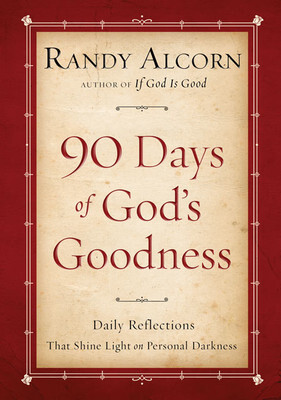 90 Days of God's Goodness
90 Days of God's Goodness 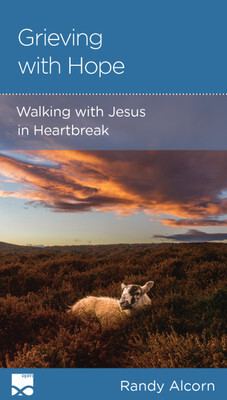 Grieving with Hope
Grieving with Hope 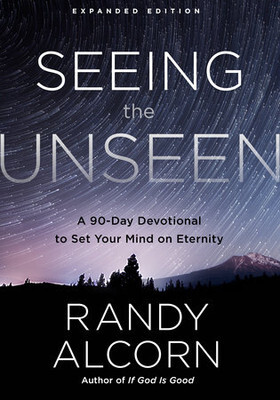 Seeing the Unseen, Expanded Edition
Seeing the Unseen, Expanded Edition
June 6, 2025
In Your Relationships with Unbelievers, Are You Influencing Them or Being Influenced?

I have seen many people, including good friends, tell themselves they’re going to influence unbelievers toward the Lord by spending time with them in their world, who end up violating Ephesians 5:11, which says, “Have no fellowship with the fruitless deeds of darkness, but rather expose them.” Before long, they’re hanging out in bars and nightclubs and watching raunchy movies and pretty much demonstrating that Christians are no different than anybody else—and sometimes they’re proud of their Christian liberty, that they’re not legalists. It’s very sad.
While I strongly believe our closest friends should be those who are walking with Jesus, it’s true we should reach out with love and friendship to those who don’t know Him at all. When Nanci and I were raising our girls, we always encouraged them to pray for unbelievers they knew, befriend them and show them the love of Christ, and invite them to church. However, their solid friendships with committed Christians—most of them in our church youth group—were absolutely crucial to their growing walk with Christ.
But as we befriend and spend time with unbelievers, we must carefully evaluate and ask ourselves: am I influencing them, or being influenced myself? Scripture tells us, “Live wisely among those who are not believers, and make the most of every opportunity” (Colossians 4:5, NLT). Am I coming into their world where I will effectively represent Christ, or where they will politely nod at my being a Christian but will expect me to align myself with their values? Maybe 90% of the time our goals and general values will overlap, or at least not contradict. But what happens in the 10%? Will they come closer to following Jesus, or will I come closer to following their idols?
You have to ask yourself, are you really prepared to represent Christ in an uncompromising way, which will at times require boldness and courage? There will be situations where you have to make a choice whether you’re going to stay at the table and listen to a story about immorality, or whether you’re going to excuse yourself and walk away. And will the urge to please them by not appearing “self-righteous” constrain you to politely listen to the story and become a participant in the unrighteousness?
Trevin Wax writes, “Our identity in Christ should be such an integral part of our lives that it is impossible for someone to know us well without understanding how our Christian faith informs our lives.” If we’re too preoccupied with the world and what people are thinking of us, then we’re liable to compromise the gospel. If we’re trying to please people through our sharing of the Gospel, then we’re going to end up revising God’s message and taking out the parts about sin and hell. What we’ll be left with is not the Gospel. Instead, may we say with Paul: “For I am not ashamed of the gospel, for it is the power of God for salvation to everyone who believes, to the Jew first and also to the Greek” (Romans 1:16).
I know of a talented musician who performed at events around the world. He decided to cross over to make an impact in the secular world. He told himself it wasn’t just to further his profession as a musician, but to reach people who need the Lord. Last I heard, he was singing in nightclubs, rarely about the Lord, and his friends said he had lost his spiritual edge. He was in danger of becoming indistinguishable from the very people he stepped away from Christian ministry in order to reach (ironically, he had been reaching a fair number of unbelievers through that Christian ministry).
I also know Christian writers who have determined they’re going to cross over to the secular market to reach more people. They are now reaching more people—but what are they reaching them with? In some cases, the answer is, not much. Certainly not the gospel. Just a cleaner than average, generally redemptive story that doesn’t curse God or make fun of Christians. That’s not a very strategic impact.
Jesus said, “‘I am the light of the world. Whoever follows me will never walk in darkness, but will have the light of life’” (John 8:12, NIV). Don’t dim that light by hiding it or trying to camouflage it. Instead do what Jesus did and “let your light shine before others, so that they may see your good works and give glory to your Father who is in heaven” (Matthew 5:16, ESV).
For more insight on this subject, see:
Wisdom in Friendships with Non-Christians
Are You Too Christian for Non-Christians?
Making Friends, But Not Disciples
Recommended Reading
 Deadline
Deadline  Heaven Tract (25-Pack)
Heaven Tract (25-Pack) 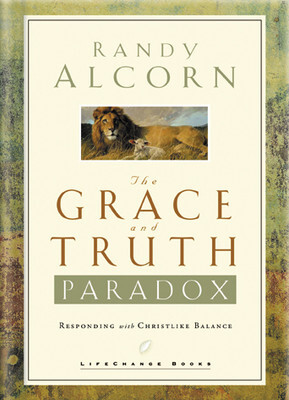 The Grace and Truth Paradox
The Grace and Truth Paradox
June 4, 2025
Can We Store up Treasures in Heaven in More Ways Than Giving Money?

The primary passage of Scripture that talks about storing up treasures in Heaven is Matthew 6:19-21, where Jesus tells us to transfer our wealth from one place to another:
“Do not lay up for yourselves treasures on earth, where moth and rust destroy and where thieves break in and steal, but lay up for yourselves treasures in heaven, where neither moth nor rust destroys and where thieves do not break in and steal. For where your treasure is, there your heart will be also.”
When we die, earthly treasure will no longer be ours, but wealth we’ve transferred to Heaven will remain ours forever.
The treasures on earth of Matthew 6 are material things. The treasures in Heaven are eternal rewards in a near context of financial giving. How does one store up treasures in Heaven? The most obvious answer is through giving, which as a spiritual discipline, along with fasting and praying, has been Christ’s subject matter.
Unfortunately, some commentaries and several sermons I’ve heard and read on Matthew 6:19–21 are remarkably vague as to its meaning. They spiritualize the passage, divorcing it from its context and failing to connect it to its parallel passages. They interpret Christ’s words as a general call to be kingdom-minded and say He makes no reference to giving away material goods.
Certainly, the passage would be far easier to fulfill if it merely required good intentions on our part. Instead, it calls us to radical acts of generosity. We dare not let our convenience and culture—including church culture—dictate our interpretation.
Craig Blomberg states in the New American Commentary on Matthew, “In this context…storing up treasures focuses particularly on the compassionate use of material resources to meet others’ physical and spiritual needs, in keeping with the priorities of God’s kingdom.”
The interpretation of Matthew 6 I advocate is emphatically supported by Paul’s statements in 1 Timothy 6, where he borrows the words of Jesus “lay up treasures for themselves”:
“Command those who are rich in this present world not to be arrogant nor to put their hope in wealth…Command them to do good, to be rich in good deeds, and to be generous and willing to share. In this way they will lay up treasure for themselves as a firm foundation for the coming age…”
“In this way” points back to doing good deeds and specifically being generous and willing to share, which are clearly about financial giving and material generosity. Financial giving is said to be a means of laying up treasure in Heaven. For Paul to speak of laying up treasure—and not only treasure but for themselves in the age to come (in Heaven)—seems an unmistakable allusion to Christ’s words in Matthew 6. I think it also demonstrates Paul’s understanding of what Jesus said.
The Matthew 6 passage and its parallels in Matthew 19, Mark 12, Luke 12, and 1 Timothy 6 show a direct connection between actually giving away money, which God in turn regards as or rewards as treasure in Heaven. Of course, Christ’s words can be broadly applied to how we use our time and abilities. But we must not deny or neglect His primary meaning concerning giving away our money and possessions.
The Bible shows that anything we put in God’s hands is an investment in eternity. That certainly includes money but is not limited to it. Giving our all to God includes our time, talents, efforts, and relationships. Every aspect of our lives must be at Christ’s disposal; that’s what it means to be His disciple (Luke 14:33).
God will reward us for more than financial giving. He will also give us eternal rewards for doing good works (Ephesians 6:8; Romans 2:6, 10), persevering under persecution (Luke 6:22–23), showing compassion to the needy (Luke 14:13–14), and treating our enemies kindly (Luke 6:35).
The way to lay up treasures in Heaven includes giving away our money and possessions but of course is not limited to it. Scripture teaches that those things which we keep can also serve kingdom purposes. They can be generously shared and invested and used in ways that serve eternal purposes, that further God’s kingdom for His glory rather than just building our own little kingdoms for our own glory.
See also:
Does Giving Time or Goods Instead of Money Earn the Same Eternal Reward?
Why Do You Believe the Word ‘Treasure’ in Matthew 6 Refers Specifically to Money and Possessions?
Recommended Reading
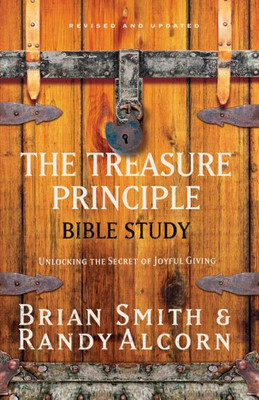 The Treasure Principle Bible Study
The Treasure Principle Bible Study 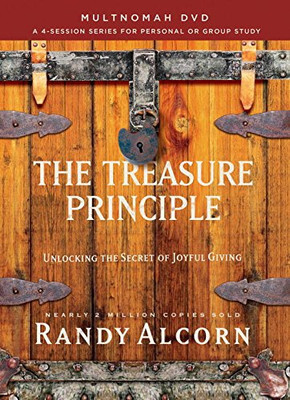 The Treasure Principle Study DVD
The Treasure Principle Study DVD 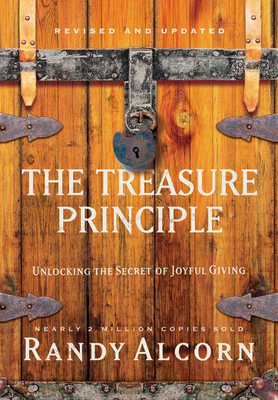 The Treasure Principle: Revised and Updated
The Treasure Principle: Revised and Updated
June 2, 2025
God’s Contraconditional Love

I met and talked with author and psychologist David Powlison only once, but I will never forget the sweetness of his spirit, and how I saw Jesus in him. His insights were penetrating and gospel-centered. My thanks to Justin Taylor for posting this excerpt from David’s booklet God’s Love: Better than Unconditional:
When you look closely, God’s love is very different from “unconditional positive regard,” the seedbed of contemporary notions of unconditional love.
God does not accept me just as I am;
He loves me despite how I am;
He loves me just as Jesus is;
He loves me enough to devote my life to renewing me in the image of Jesus.
This love is much, much, much better than unconditional! Perhaps we could call it “contraconditional” love.
Contrary to the conditions for knowing God’s blessing, He has blessed me because His Son fulfilled the conditions.
Contrary to my due, He loves me.
And now I can begin to change, not to earn love but because of love.
. . . You need something better than unconditional love.
You need the crown of thorns.
You need the touch of life to the dead son of the widow of Nain.
You need the promise to the repentant thief.
You need to know, “I will never leave you or forsake you.”
You need forgiveness.
You need a Vinedresser, a Shepherd, a Father, a Savior.
You need to become like the one who loves you.
You need the better love of Jesus.
Recommended Reading
 90 Days of God's Goodness
90 Days of God's Goodness 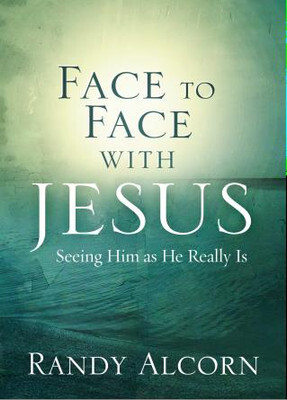 Face to Face with Jesus
Face to Face with Jesus  The Grace and Truth Paradox
The Grace and Truth Paradox
May 30, 2025
50 Years Ago, Nanci and I Said “I Do”

Tomorrow, May 31, is Nanci’s and my 50th wedding anniversary. I thank God for His faithfulness and the time we had together.
 I’m so grateful for how Nanci put up with me for all those years, and for being not only my wife, but also my best friend and my closest sister in Christ. I keep thanking God for her partnership and companionship in the gospel. I first heard the gospel from Nanci, and we discussed messages I was hearing at church and youth group for eight months before I came to Christ as a sophomore in high school. Later, we went through Bible college together and were in most of each other’s classes. We discussed lectures and did our homework together.
I’m so grateful for how Nanci put up with me for all those years, and for being not only my wife, but also my best friend and my closest sister in Christ. I keep thanking God for her partnership and companionship in the gospel. I first heard the gospel from Nanci, and we discussed messages I was hearing at church and youth group for eight months before I came to Christ as a sophomore in high school. Later, we went through Bible college together and were in most of each other’s classes. We discussed lectures and did our homework together.
We wanted to grow old together. If you’d told us when we got married at 21 that we would live to be 68, we would have said, we did grow old together! But when you’re 68, it’s like the new 48. Nanci and I were married in 1975, but we were best friends from the day we met as freshmen in high school, December 7, 1968. She was my closest friend for 53 and a half years. That is a privilege and a treasure. I will not regret the years we might have had but be profoundly grateful for the years we did have—and not just the quantity, but the quality.
In the years before Nanci died, we experienced what it was to love and trust each other more than we ever had. A couple of weeks before her homegoing, Nanci was sitting up in bed, and I was holding her hand and she said, smiling but in tears, “Randy, thank you for my life." I said in tears, "Nanci, thank you for my life." I thought it was so beautiful that we saw our lives as so intertwined, we really had become one. We certainly didn’t do everything right, but by God’s grace, He used us in each other’s lives to grow us spiritually, and to make us better followers of Jesus.

Nanci and I knew God to be good and kind and absolutely faithful before her four plus years of dealing with cancer, but we saw Him in so many ways during that time that it brings tears of profound gratitude to my eyes.
Because of the Lord’s great love we are not consumed,
for his compassions never fail.
They are new every morning;
great is your faithfulness.
Lamentations 3:22–23
 The memories are so good and so precious that they make me smile and fill my heart. At first after her death, it was nine parts sorrow for every one part joy. A year later, it was five parts of each, and now it is nine parts happiness and one part sorrow. I have wept often, but I experience more joy in reflecting upon her than I do sorrow. There is no despair, only gratitude.
The memories are so good and so precious that they make me smile and fill my heart. At first after her death, it was nine parts sorrow for every one part joy. A year later, it was five parts of each, and now it is nine parts happiness and one part sorrow. I have wept often, but I experience more joy in reflecting upon her than I do sorrow. There is no despair, only gratitude.
I can't live without Jesus, and while I don't want to live without Nanci, that is the way it is, and for now I must. I am sorrowful, yet always rejoicing, as Paul says in 2 Corinthians 6:10. I love that we are to be always rejoicing, instead of always sorrowful—the joy eclipses the sorrow.
It is my wholehearted belief that Nanci’s death was not the end of our relationship, only a temporary interruption. The great reunion awaits us, and I anticipate it and delight in imagining it with everything in me.
According to what Jesus said in Matthew 22:38 we will not be married to our earthly spouses in Heaven, but if they and we are believers, we should not think for a moment that we will not have a great relationship with them. I’m well aware that many marriages have not worked out on earth. But we will all be married to Jesus, and He will never let us down. So it's not that there is no marriage in Heaven, but that there is one marriage in Heaven, and all of us will experience that as the corporate bride of Christ. (See this article for more.)
I fully anticipate no one besides God will understand me better on the New Earth than Nanci, and there’s nobody whose company I’ll seek and enjoy more than Nanci’s. The joys of marriage in eternity will be far greater because of the character and love of our Bridegroom. I rejoice for Nanci and for me that we’ll both be married to the most wonderful person in the universe.
Also, while thinking about what I would say in this blog, I entered my name and Nanci's into a normal search engine (not AI) and the first thing that popped up was something generated by artificial intelligence that said I was remarried in August 2024. If you didn't know that, welcome to the club, because I didn't know it either. My first thought was “whoever she is, I better get her something for our first anniversary.”
Seriously, I have not remarried, though it would be perfectly fine if I did. But I have no plans for remarriage. Artificial intelligence can be great, but there is a reason it is called “artificial.” 😂
Recommended Reading
 Grieving with Hope
Grieving with Hope 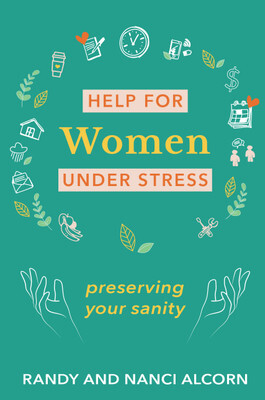 Help for Women Under Stress
Help for Women Under Stress  The Promise of the New Earth
The Promise of the New Earth
May 28, 2025
William Wilberforce Encourages Us to Look to Jesus, and Be Happy

One of my great heroes is William Wilberforce. He is credited as the primary human agent to bring about the end of slavery in England. Wilberforce wrote,
The gospel freely admitted makes a man happy. It gives him peace with God, and makes him happy in God. It gives to industry a noble, contented look which selfish drudgery never wore; and from the moment that a man begins to do his work for his Saviour’s sake, he feels that the most ordinary employments are full of sweetness and dignity, and that the most difficult are not impossible.
And if any of you, my friends, is weary with his work, if dissatisfaction with yourself or sorrow of any kind disheartens you, if at any time you feel the dull paralysis of conscious sin, or the depressing influence of vexing thoughts, look to Jesus, and be happy. Be happy, and your joyful work will prosper well.
Martin Luther King Jr. said, “If a man is called to be a street sweeper, he should sweep streets even as Michelangelo painted, or Beethoven composed music or Shakespeare wrote poetry. He should sweep streets so well that all the hosts of heaven and earth will pause to say, ‘Here lived a great street sweeper who did his job well.’”
This is a biblically grounded statement, in keeping with the words of Paul: “Whatever you do, work heartily, as for the Lord and not for men” (Colossians 3:23). When we work out of duty alone, we likely won’t experience happiness. When we’re trying to please people, we become unhappy if they’re displeased with us. If we labor to earn God’s favor, we’ll either imagine we’ve earned it and become proud and unhappy, or we’ll realize we can’t and become depressed and unhappy. Working for minimum wage, or for no pay at all, when done honestly and for God’s glory, can bring more joy than any million-dollar salary (see Proverbs 10:9; Proverbs 11:1; 1 Corinthians 4:2; 1 Corinthians 10:31; Hebrews 13:18).
Scripture calls us to actively cultivate the habit of happiness by rejoicing, praying, and giving thanks (see 1 Thessalonians 5:16-18). Do you continually open your eyes to look past yourself and see God and His hand at work? Do you regularly look for reasons to thank Him?
God Himself models His inspired command to rejoice always. He sympathizes with all His suffering children, but He rejoices in purchasing our redemption and making us more like Jesus. He joyfully prepares a place for us, and He has eternally happy plans. He has the power to accomplish everything, as well as the sure knowledge that it will happen.
As God’s children, we have a history of His faithfulness in the past and an assurance of a secure future, which should define how we view our present. This perspective can infuse us with happiness even in what would otherwise be the unhappiest times of our lives. “So we fix our eyes not on what is seen, but on what is unseen, since what is seen is temporary, but what is unseen is eternal” (2 Corinthians 4:18, NIV).
Recommended Reading
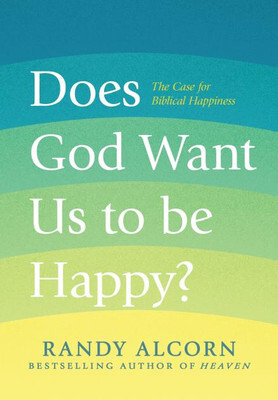 Does God Want Us to Be Happy?
Does God Want Us to Be Happy?  God's Promise of Happiness
God's Promise of Happiness  Happiness (softcover)
Happiness (softcover)
May 26, 2025
What Does It Mean to Give Quietly?

Jesus says, “Be careful not to do your ‘acts of righteousness’ before men, to be seen by them. If you do, you will have no reward from your Father in heaven” (Matthew 6:1). The illustrations that follow include prayer and fasting, but begin with giving. When you give to the needy, He says, don’t announce it, as do the hypocrites, who want to be honored by men. Instead, give quietly, not telling anyone, “so that your giving may be in secret. Then your Father, who sees what is done in secret, will reward you” (Matthew 6:4).
I read of a New York fund-raising dinner where people stood up to identify themselves and make pledges to a charitable cause. One man rose, gave his name, his wife’s name, the name of his business, its location, and the kind of merchandise he sold, then loudly announced, “We want to give $5,000 anonymously.”
Showiness in giving is always inappropriate. But sometimes our acts of righteousness will be seen by men and even should be. The world will know we are Christians by our love for each other (John 13:35), but our acts of love must be visible, just as they were when the early Christians sold their property and gave away the proceeds to meet each other’s need. Earlier in the same sermon where He says we’re not to give in order to be seen by men, Christ commands us, “Let your light shine before men, that they may see your good deeds and praise your Father in heaven” (Matthew 5:16).
How can we reconcile these commands? We do so by realizing that Christ’s point is about our motives: Don’t do a righteous act in order to impress people. But when you do a good work, use that opportunity to bring praise to God. What Jesus objects to is not that men would know we give, but that we would give to impress men rather than to please God.
The same principle applies to prayer. Jesus tells us to pray in secret, and God will reward us for that (Matthew 6:6). Yet gathering for group prayer is certainly important (Matthew 18:19-20). God wants us to pray secretly sometimes but not others. He also wants us to give secretly sometimes but not others. It all comes down to the motives of our heart.
Many Christian organizations and churches put contributors’ names on plaques, bricks, pews, and cornerstones. They publish donor lists and name schools and buildings after patrons. This surely encourages the very thing Jesus condemned. It’s hard to understand how we could read this passage and still continue these practices. What are we thinking? By granting the reward of human recognition, we deprive givers of the one reward that would count for eternity: God’s reward.
Studies show that people give more when they get public recognition—but in the Church is that the right thing to do? During a building project years ago, our church elders were considering whether to offer to put givers’ names on individual bricks. One of the elders said, “If we do that, I hope those people really like bricks, because if that’s why they give, it’s the only reward they’re going to get.” Eventually we decided against the idea, because we thought it would tempt people to give for the wrong reasons—and would thereby remove God’s blessing from that building project.
In some circles, “giving” is merely the price of admission for social status. Many people’s businesses have flourished more than the value of their giving through the publicity their giving produces. If this is their motive, then their “giving” is merely a business expense.
I’m always amused at companies that purchase an advertisement for $300,000 to make a big deal out of giving $20,000 to needy kids. Why not just give $320,000 to help the kids and shut up about it? What they’re doing is not about giving—it’s about self-promotion for the purpose of financial gain.
Some use giving to purchase recognition, while others use it to purchase control. They give with strings attached, pulling this string and that, leaving the recipient organization afraid not to comply since it will mean losing future gifts. This is the stockholder mentality. It’s common in local churches where the wealthy can wave their money and lobby for what they want, or strike back by withholding their giving when they don’t get their way. At a church where there was disagreement over who should serve as a new pastor, one board member said, “I’ve poured a lot of money into this church, and I intend to get the pastor I want.” In the truest sense, of course, this man wasn’t giving money to God or the church. He was spending money, under the guise of giving, to purchase control and ego enrichment. God wants quiet and humble givers, not self-serving power brokers.
The best way to avoid exalting givers is to avoid knowing who they are in the first place. There are many reasons for keeping giving anonymous. Most churches have one or two financial secretaries who record donations for tax purposes. These people are the only ones who know who gives what. Other times one or more pastors, elders, or deacons are also aware of giving levels.
There are several reasons why I believe that no one in church leadership should know who’s giving what. If leaders know how much people give, they’ll be tempted to show preference to big givers and neglect those who give less. This is the very trap Scripture warns against, calling it “favoritism” and “evil” (James 2:1-5). Also, it puts leaders in a position of judging others with incomplete knowledge. They may conclude that some people are unspiritual and others are spiritual, without knowing the whole story. (This is different in parachurch ministries, because there is limited direct contact between most ministries and many of their supporters. Consequently, the circumstances do not exist for givers to be compared as readily as they might be in a church, and conclusions are rarely drawn about nongivers.) In some cases, church leaders’ judgments may be accurate, but still unhealthy. Those who have served as financial secretaries carry the burden of knowing when vocal church members whom everyone admires give nothing to the church.
The most important reason for anonymous giving is to remove or at least minimize the temptation to give in order to impress others. If the pastor or the board knows how much I give, I may give in order to impress them. But if I do, Jesus says, I have my reward and will receive none from Him. When I give at my church, I’m grateful there are only one or two people I could be tempted to impress. The fewer the better.
One of the great tests for Christian leaders is whether we can trust God to provide financially without courting or favoring big donors. And perhaps the greatest test for givers is whether we are able to give of ourselves and our resources without getting the credit, concerned only that God gets the glory.
For misrepresenting their giving, God struck Ananias and Sapphira dead (Acts 5:1-10). Keep in mind that they were generous donors. Many Christian ministries today would pay their way to a donors’ conference in a gorgeous hotel in the Caribbean or name a new building after them. If we are tempted to exaggerate our giving or make it appear we’re making more sacrifice than we are, we should take seriously what God did to Ananias and Sapphira!
The Master says, “Well done” to the servant, not for being well known or popular or for getting his name engraved on cornerstones and having buildings named after him. Rather He commends him for being “good” and “faithful.” When we’re true servants, it isn’t about us. We’re like the ox grinding out the corn. We don’t own the corn, and we don’t get credit for growing it. We just do our job and get to eat some of it, and we’re grateful for that. Recognition isn’t what it’s about.
Recommended Reading
 Giving Is the Good Life
Giving Is the Good Life 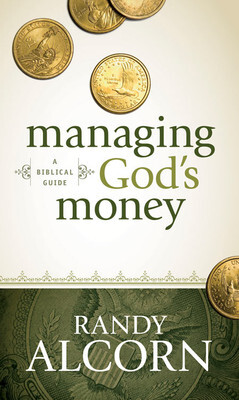 Managing God's Money
Managing God's Money 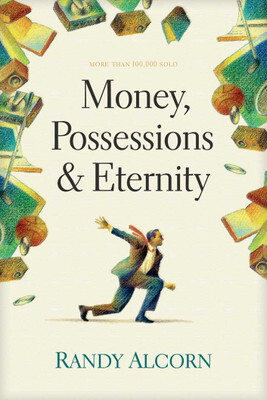 Money, Possessions and Eternity
Money, Possessions and Eternity
May 23, 2025
There’s Pride in Choosing Our Own Preferences over God’s Revealed Doctrines

Our theology tends to come from whatever we trust. The fact that a writer or teacher has some good insights along the way makes the heresy all the more effective. Hand somebody undisguised rat poison and they won’t eat it. Cover it in chocolate, and they likely will. All effective heresy contains much that is true—it’s the chocolate that deceives us into eating rat poison.
First Timothy 4:1 says, “The Spirit clearly says that in later times some will abandon the faith and follow deceiving spirits and things taught by demons” (“doctrines of demons” in some translations). False doctrine is more than errant human opinion. Often its source is in another world, where evil spirits labor to deceive us. Ironically, demons know true doctrine better than we do—making them all the more effective in obscuring and twisting it: “You believe that there is one God. Good! Even the demons believe that—and shudder” (James 2:19).
A remarkable statement is made in 1 Timothy 6:3-4: “If anyone teaches false doctrines and does not agree to the sound instruction of our Lord Jesus Christ and to godly teaching, he is conceited and understands nothing...”
A rather blanket condemnation, but nonetheless, that’s what Scripture says. What strikes me is the first description that comes to Paul’s mind, as prompted by the Holy Spirit: before all else, a teacher of false doctrines is regarded as conceited. Why? I think it’s because he chooses his preferred doctrines over God’s revealed doctrines. And that is not just error, it is the ultimate conceit. It says, “I trust my own opinions and perspectives [which are often identical to the current drift of a person’s culture] more than I trust God’s.” Hence, he is putting himself in God’s place. He makes himself God.
The judgment upon the false prophet is serious indeed (capital punishment in Old Testament). The burden laid on Bible teachers in the New Testament is heavy: Titus 2:1 says, “You must teach what is in accord with sound doctrine.” That’s a good verse to put on our desks and screens. And hence, James says, “Not many of you should presume to be teachers, my brothers, because you know that we who teach will be judged more strictly” (James 3:1).
There is humility in submitting to God’s revealed truth even when we do not like its implications, or wish it were otherwise. The doctrine of eternal hell is a prime example—I do not “like” it, but I accept and submit to it, and recognize any of my instincts and arguments against it are but straw. Jesus spoke more of it than anyone—who am I to suggest some way around a doctrine that Christ embraced and taught?
Consider the vested interests that demons have in our not believing in Hell! If I were to join many people in saying “There is no eternal hell” or “No one will go to hell,” I might fancy myself civilized and compassionate, but in fact I would simply be a heretic, trusting in my insights and doctrines over my Lord’s—and hence proving that I or my culture, not He, is my real “Lord.”
When it comes to books, many imagine that nonfiction is teaching and fiction is not, hence that nonfiction relates to doctrine and truth, but fiction doesn’t. That’s simply not true. I have written several novels, and over the years I’ve discovered that fiction is a different form of teaching, less didactic of course, but sometimes even more effective. Fiction has a Trojan Horse effect, wherein the novelist’s worldview is allowed unguarded entry into the gates of the reader’s minds. Often that worldview subversively (for better or for worse) comes out and does its work under cover of darkness, sometimes overthrowing the mind that opened its gates, having no thought to what was hidden within the story. Perspectives are changed and belief systems are modified—sometimes radically—regardless of the author’s intent. Hence, not just pastors and seminary instructors, but novelists are the teachers of James 3:1 who will be judged more strictly.
This is why I encourage all Christians to study sound doctrine. It will prove of strategic and eternal importance to ourselves, those we influence, and most importantly, our Lord.
Recommended Reading
 Face to Face with Jesus
Face to Face with Jesus 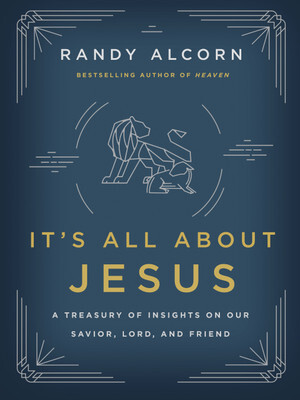 It's All About Jesus
It's All About Jesus  The Grace and Truth Paradox
The Grace and Truth Paradox
May 21, 2025
Reforming Our Vocabulary to Fit the Resurrection

A radio preacher, speaking about a Christian woman whose Christian husband had died, said, “Little did she know that when she hugged her husband that morning, she would never hug him again.”
Though the preacher’s words were well intentioned, they were not true. He could have said, “She’d never again hug her husband in this life,” or better, “She would not be able to hug her husband again until the next world.” Because of the coming resurrection of the dead, we will be able to hug each other again—on the New Earth.
Someone might say, “We all know what the preacher meant.” But I’m not sure we really do—or that he really did. I’m not trying to be picky, but we need to carefully reform our vocabulary to express what’s actually true. If we don’t, we will ultimately fail to think biblically and continue to embrace predominant stereotypes of Heaven.
“That’s the last time I’ll ever see him in his body,” a man said of his son who died. No. Because they were both Christians, they will see each other again in their resurrection bodies.
“I’ll never see my daughter again on this earth.” But if she is a believer, and you are, then the statement is wrong. You will see her again on this earth. You and she will be transformed, and the earth will be transformed, but it will still really be you and your daughter on an Earth that really is the same Earth.
We do not just say what we believe—we end up believing what we say. That’s why I propose that we should consciously correct our vocabulary so it conforms to revealed biblical truth. It’s hard for us to think accurately about the New Earth because we’re so accustomed to speaking of Heaven as the opposite of Earth. It may be difficult to retrain ourselves, but we should do it. We must teach ourselves to embrace the principle of continuity of people and the earth in the coming resurrection that Scripture teaches.
Because ethereal notions of Heaven have largely gone unchallenged, we often think of Heaven as less real and less substantial than life here and now. (Hence, we don’t think of Heaven as a place where people will hug, and certainly not in these bodies.) But in Heaven we won’t be shadow people living in shadowlands—to borrow C. S. Lewis’s imagery. Instead, we’ll be fully alive and fully physical in a fully physical universe.
In one sense, we’ve never seen our friend’s body as truly as we will see it in the eternal Heaven. We’ve never been hugged here as meaningfully as we’ll be hugged there. And we’ve never known this earth to be all that we will then know it to be.
Jesus Christ died to secure for us a resurrected life on a resurrected Earth. Let’s be careful to speak of it in terms that deliver us from our misconceptions and do justice to the greatness of Christ’s redemptive work.
Recommended Reading
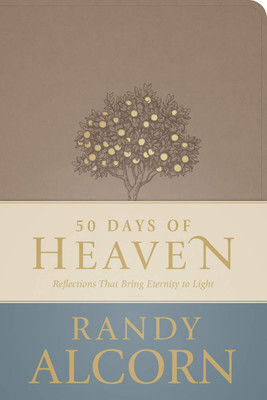 50 Days of Heaven (Special Edition)
50 Days of Heaven (Special Edition)  Heaven
Heaven  The Promise of the New Earth
The Promise of the New Earth



